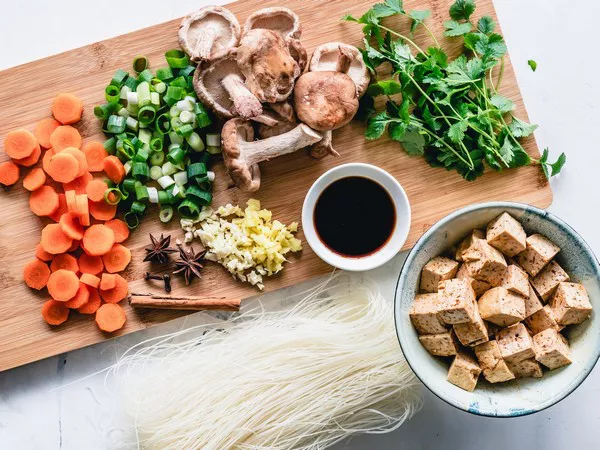Cucumbers are often considered a crisp and refreshing addition to salads and sandwiches, but did you know they also offer a surprising array of vitamins and health benefits? In this comprehensive guide, we’ll explore the vitamins contained in cucumbers, their significance for health, and how this humble vegetable can be an excellent addition to your diet.
SEE ALSO: What Vitamins Does a Tomato Have? You Need to Know
A Brief Introduction of Cucumber
Before delving into the vitamins found in cucumbers, let’s get better acquainted with this vegetable:
Cucumbers belong to the gourd family and are primarily composed of water, making them a hydrating choice, especially during hot weather. Cucumbers are known for their versatility. They can be sliced, diced, or eaten whole. What’s more, they are low in calories, making them a guilt-free snack.
Cucumbers, often associated with their crisp and hydrating qualities, boast a surprisingly robust vitamin profile that contributes to overall health and well-being. Let’s take a closer look at the vitamins found in cucumbers and understand their significance:
1. Vitamin K: Blood Clotting and Bone Health
Blood Clotting: Vitamin K, found in cucumbers, plays a critical role in the blood clotting process. When you get a cut or bruise, vitamin K helps your blood coagulate and stop bleeding.
Bone Health: Vitamin K is also essential for bone health. It assists in the regulation of calcium, ensuring it is properly deposited in bones, making them strong and resilient.
SEE ALSO: 10 Foods Contain Vitamin K for Your Bodily Functions
2. Vitamin C: Immune Boost and Skin Health
Immune Boost: Cucumbers provide a moderate amount of vitamin C, a powerful antioxidant that strengthens the immune system. This vitamin helps your body fend off infections and illnesses, making it a valuable asset to your overall health.
Skin Health: Vitamin C is synonymous with skin health. It is a vital component in the production of collagen, a protein that maintains skin elasticity and wards off premature aging. Regular consumption of vitamin C-rich foods, such as cucumbers, can contribute to youthful and radiant skin.
SEE ALSO: 5 Vitamins that Bolster Your Immune System
3. Vitamin A: Eye Health and Immunity
Eye Health: Vitamin A is essential for maintaining good vision and eye health. It plays a crucial role in the proper functioning of the retina and the prevention of night blindness.
Immunity: Beyond its role in eye health, vitamin A also contributes to immune function. It helps maintain the integrity of the skin and mucous membranes, acting as a defense against invading pathogens.
4. Vitamin B5 (Pantothenic Acid): Energy Metabolism
Energy Metabolism: Vitamin B5, or pantothenic acid, is a key player in energy metabolism. It assists in converting the carbohydrates, fats, and proteins you consume into energy that your body can use to power various physiological processes.
5. Vitamin B1 (Thiamine): Nervous System Function
Nervous System Function: Thiamine, commonly known as vitamin B1, found in cucumbers, is vital for maintaining a healthy nervous system. It aids in the proper transmission of nerve signals and plays a role in converting carbohydrates into energy.
6. Vitamin B7 (Biotin): Hair and Nail Health
Hair and Nail Health: Biotin, also known as vitamin B7 or vitamin H, is often associated with promoting the health of hair and nails. It is involved in various metabolic processes in the body and is essential for maintaining the strength and vitality of these tissues.
7. Vitamin B6 (Pyridoxine): Brain Health
Brain Health: Pyridoxine, or vitamin B6, is crucial for brain health and function. It supports the development and operation of the nervous system and plays a role in mood regulation and cognitive processes.
8. Vitamin B9 (Folate): Cell Growth and Development
Cell Growth: Folate, another essential vitamin found in cucumbers, is necessary for cell growth and division. It plays a particularly critical role during pregnancy, where it aids in the development of the fetal neural tube, preventing birth defects.
9. Vitamin B3 (Niacin): Metabolism and Skin Health
Metabolism: Niacin, also known as vitamin B3, is involved in metabolism and assists the body in converting food into energy.
Skin Health: Niacin can also promote healthy skin, making it valuable for maintaining a clear and vibrant complexion.
10. Vitamin B2 (Riboflavin): Energy Production
Energy Production: Riboflavin, or vitamin B2, contributes to energy production in the body. It is vital for the breakdown of carbohydrates, fats, and proteins, ensuring they are efficiently converted into energy.
SEE ALSO: 7 Vitamins Effective in Fat Burning & Their Combinations
Practical Tips for Incorporating Cucumbers into Your Diet
Now that we’ve explored the impressive vitamin profile of cucumbers, it’s time to discover practical ways to make cucumbers a regular and enjoyable part of your diet. Here are some creative and nutritious ways to incorporate cucumbers into your meals:
1. Fresh and Crunchy Snack
Cucumber Sticks with Dip: Slice cucumbers into sticks or rounds and pair them with your favorite dip. Hummus, tzatziki, or a yogurt-based dip are excellent choices. This makes for a satisfying and hydrating snack.
2. Salads
Cucumber and Tomato Salad: Combine cucumber slices with ripe tomatoes, red onions, fresh basil, olive oil, and a splash of balsamic vinegar. This classic salad offers a refreshing and vitamin-packed side dish.
Greek Salad: Create a Greek salad by mixing cucumbers with Kalamata olives, feta cheese, red onions, and a drizzle of extra-virgin olive oil. The cucumbers provide a delightful crunch to balance the flavors.
Cucumber Avocado Salad: Pair cucumbers with creamy avocado slices, red pepper flakes, and a zesty lime dressing for a satisfying and nutrient-rich salad.
3. Hydration
Infused Water: Elevate your water game by adding cucumber slices to a pitcher of water. This not only imparts a subtle and refreshing flavor but also encourages hydration.
Cucumber Cooler: Blend cucumbers with water, a touch of honey or agave nectar, and a squeeze of lemon for a homemade cucumber cooler. It’s a revitalizing beverage on hot days.
4. Pickles
Fermented Cucumbers: Pickling cucumbers with vinegar, herbs, and spices creates delicious and tangy pickles. They make for a flavorful snack or a zesty addition to sandwiches and burgers.
5. Cucumber Smoothies
Green Smoothie: Blend cucumbers with leafy greens, such as spinach or kale, along with fruits like apples, bananas, and a splash of coconut water or yogurt. This green smoothie is packed with vitamins and provides a refreshing start to your day.
6. Cucumber Sushi Rolls
Cucumber Rolls: Use cucumber slices as a wrapper for sushi fillings like avocado, crab, or smoked salmon. These cucumber rolls offer a low-carb alternative to traditional sushi rolls.
7. Chilled Soups
Gazpacho: Whip up a cooling gazpacho by blending cucumbers with tomatoes, bell peppers, onions, garlic, and a hint of vinegar. It’s a refreshing and nutritious summer soup.
8. Cucumber Salsa
Fresh Salsa: Dice cucumbers and mix them with tomatoes, red onions, cilantro, jalapeño, lime juice, and a pinch of salt. This cucumber salsa is a vibrant topping for grilled chicken, fish, or tacos.
9. Cucumber Wraps
Lettuce Wraps: Replace lettuce leaves with cucumber slices to create low-carb wraps. Fill them with your choice of protein, vegetables, and your favorite sauce for a crunchy and satisfying meal.
10. Cucumber Dressing
Creamy Cucumber Dressing: Blend cucumbers with yogurt, garlic, dill, and lemon juice to create a creamy and refreshing salad dressing. Drizzle it over greens for a light and flavorful salad.
Conclusion: Cucumbers – More Than Just Water
Cucumbers are not just a watery vegetable; they are a rich source of vitamins that can benefit various aspects of your health, from your immune system and skin health to energy metabolism and bone health. Incorporating cucumbers into your diet can be a simple yet effective way to ensure you’re getting a range of essential vitamins. So, the next time you reach for a cucumber, remember that it’s more than just a salad ingredient; it’s a nutritious addition to your overall well-being.
[inline_related_posts title=”Related Topics” title_align=”left” style=”list” number=”3″ align=”none” ids=”1958,1955,1894″ by=”categories” orderby=”rand” order=”DESC” hide_thumb=”no” thumb_right=”no” views=”no” date=”yes” grid_columns=”1″ post_type=”” tax=””]


































